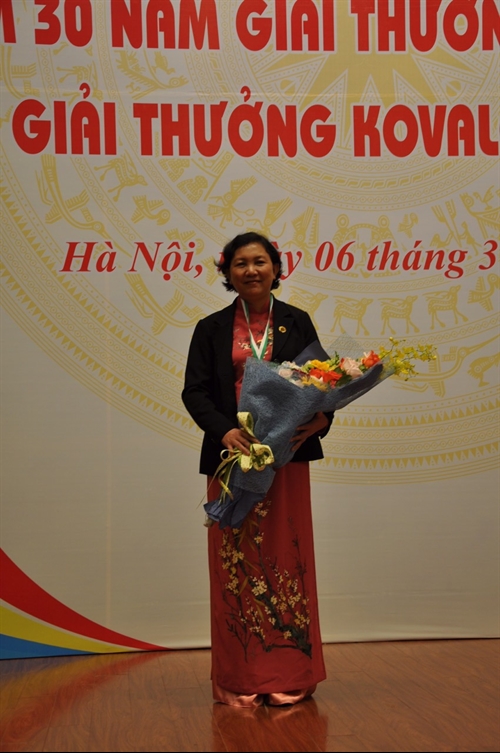 Society
Society

From theory to practice: a doctor’s passion for research helps critically ill patients
 |
| Dr Phạm Thị Ngọc Thảo, deputy head of Chợ Rẫy Hospital in HCM City, was one of two women to receive the 2015 Kovalevskaia Award, which honours outstanding female scientists. A ceremony was held on March 6 in Hà Nội. Photo courtesy of Chợ Rẫy Hospital. |
Gia Lộc
HCM CITY — Dr Phạm Thị Ngọc Thảo, one of two women given the 2015 Kovalevskaia Award for outstanding female scientists, is passionate about applying the findings of her research to benefit patients nationwide.
The deputy head of HCM City’s Chợ Rẫy Hospital, Thảo, 49, works in the hospital’s intensive care unit. She has taken part in 60 applied research projects, including many with international universities.
The findings of her many research projects have been applied at hospitals around the country.
For instance, her research on advanced dialysis for emergency patients has helped reduce the rate of fatality from 70-75 per cent to 50 per cent among patients who have had sepsis and multisystem organ failure.
Her treatment methods have been used in clinical practice at Chợ Rẫy Hospital and are now in use at hospitals in the provinces of Đắk Lắk, Bà Rịa-Vũng Tàu, Trà Vinh and Sóc Trăng.
Continuous renal replacement therapy is used for up to 24 hours a day. The treatment purifies blood outside the body for patients with impaired renal function.
“This therapy is the best choice for patients with acute kidney failure and sepsis shock who are being treated at the ICU. Their survival rate is low,” she said.
Compared to hemodialysis, which is commonly used for patients with chronic kidney failure and for some with acute kidney failure, renal replacement therapy helps maintain and restore a net neutral fluid balance.
Excess metabolic waste products are also removed, according to Thảo.
“My research has had effective clinical application, which makes me happy as it benefits patients,” she said.
“My enthusiasm and passion for research motivates me to try to discover new advanced treatments,” she added.
Thảo said that scientific research was also important in the field of emergency medicine.
She has collaborated with many international organisations to study patients admitted to emergency wards.
To improve urgent-care services, Thảo has conducted research on emergency ultrasound for trauma patients and other issues related to emergency care.
“If we are successful in applying our research, we can persuade our colleagues to enhance their competency and save more and more patients,” she said.
Lifelong learning
Despite her success, Thảo has no intention of resting on her laurels.
She always forces herself to think, learn and conduct further research.
At Chợ Rẫy Hospital, she said that many patients with renal failure were in the last stage of the disease. Most of them need a kidney transplant.
Thảo wants to find more sources of organs from people who have suffered cardiac arrest (non-heart beating donors) as well as brain-dead patients.
“It was difficult to revive dead kidneys, so we needed more training,” she said, adding that she contacted foreign doctors in the field to learn more about transplantation.
In 2013, she embarked on research related to kidneys taken from cardiac-arrest donors.
As a result, she was able to establish a protocol for diagnosis of cardiac arrest and resuscitation, or restoration, of kidneys taken from the bodies of cardiac arrest donors.
“It is very important to rejuvenate the kidneys for transplant operations. The kidney resuscitation procedure is a race against time. Being a bit late can reduce the quality of the kidney,” she said.
Other research conducted by Thảo and colleagues has focused on recovery of patients who have had liver transplants and the resuscitation of livers from brain-dead (heart-beating) donors. The research was supported by the Asan Medical Centre in Korea.
“Ethics in scientific research is also very important,” Thảo said. “We have to inform patients about both positive and negative influences of advanced treatments.”
Thảo said she was willing to train other colleagues at Chợ Rẫy Hospital and around the country.
“I cannot be the only one. By training more and more doctors and nurses, more and more patients can benefit. Working in a team with doctors in various medical fields improves treatment quality,” she said.
As a lecturer at HCM City University of Medicine and Pharmacy and an advisor for postgraduates at Chợ Rẫy Hospital, Thảo transmits her passion to her students and doctors on a daily basis.
“They should identify their objectives in life and think about the way they can apply their research to real life,” she said. -- VNS




